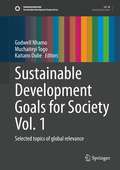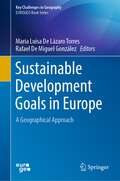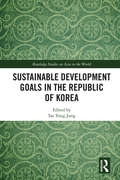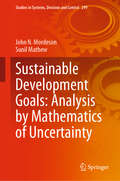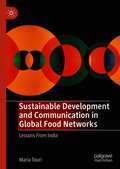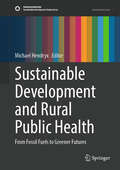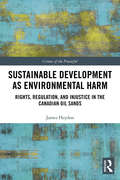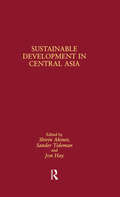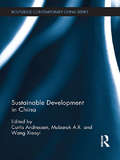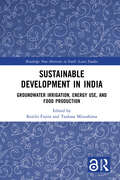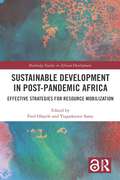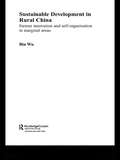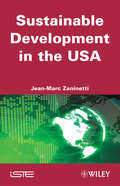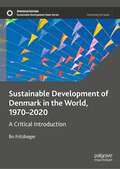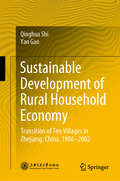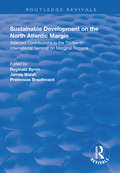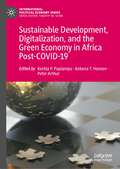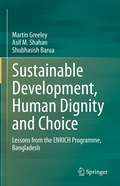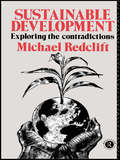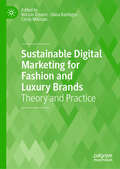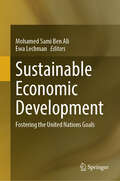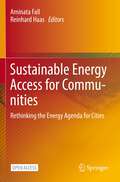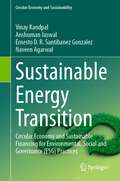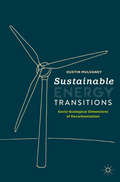- Table View
- List View
Sustainable Development Goals for Society Vol. 1: Selected topics of global relevance (Sustainable Development Goals Series)
by Godwell Nhamo Kaitano Dube Muchaiteyi TogoWritten by 43 authors from Africa, Europe and Latin America, this book presents 19 topics addressing poverty in the context of Sustainable Development Goals (SDGs), leadership in implementing SDGs, and SDGs in service delivery and local government. As the world has gone past five years of implementing the 2030 Agenda for Sustainable Development and the intertwined 17 SDGs, new opportunities in research continue to open up. Hence, documenting some of the initiatives put in place around the world regarding the implementation of the SDGs is one of the aims of this publication. With 10 years remaining, the book further enhances the desire to scale up SDGs implementation. The selection of case studies from the selected regions also provides a balance in terms of how the SDGs are being rolled out for economic growth, environmental stewardship and social protection. The ambition remains even with the challenge brought by the COVID-19 pandemic that preoccupied the whole of 2020; spilling over to 2021. There is no doubt that resources have been diverted, but the world must stay on the course to 2030 and beyond. Therefore, the book is relevant for several stakeholders including the academics, development partners, government officials and other individuals that are involved in making sure no one is left behind in the lead to 2030.
Sustainable Development Goals in Europe: A Geographical Approach (Key Challenges in Geography)
by María Luisa De Lázaro Torres Rafael De Miguel GonzálezThe aim of this book is to provide a synthesis of the newest research in Geography concerning the Sustainable Development Goals (SDG’s). Although the world is strongly interconnected, the majority of the chapters in this volume focus on Europe or the work of European researchers. Each chapter of this book focusses on one of the 17 SDG’s providing in-depth knowledge from a geographical perspective, fostering comprehensive research on these global targets to end poverty, fight inequality and injustice, and tackle climate change.The Sustainable Development Goals are part of the 2030 Agenda for Sustainable Development. To achieve them, it will be necessary for all stakeholders, including citizens (civil society, doctors, teachers), governments, private sector to collaborate.
Sustainable Development Goals in the Republic of Korea (Routledge Studies on Asia in the World)
by Tae Yong JungThis book explores the attempts of South Korea in its to achieve the UN’s Sustainable Development Goals (SDGs) by 2030. It addresses 6 of the 17 goals – clean water, affordable and clean energy, decent work and economic growth, sustainable cities and communities, climate action, and partnership – and defines specific national strategies. For each strategy, the contributors define the research indicators they selected, then analyze and examine the extent to which South Korea has met the SDG concerned. They draw these conclusions from national and international reports, government documents and policy papers on SDGs. South Korea’s experience in sustainable development and green programs will contribute to the planning of long-term development strategies for developing countries.
Sustainable Development Goals: Analysis by Mathematics of Uncertainty (Studies in Systems, Decision and Control #299)
by John N. Mordeson Sunil MathewThis book uses mathematics of uncertainty to examine how well countries are achieving the 17 Sustainable Development Goals (SDGs) set by the members of the United Nations, with a focus on climate change, human trafficking and modern slavery. Although this approach has never been used before, mathematics of uncertainty is well suited to exploring these topics due to the lack of accurate data available. The authors place several scientific studies in a mathematical setting to pave the way for future research on issues of sustainability, climate change, human trafficking and modern slavery to using a wide range of mathematical techniques. Moreover, the book ranks countries in terms of their achievement of not only the SDGs, but in particular those SDGs pertinent to climate change, human trafficking, and modern slavery, and highlights the deficiencies in the foster care system that lead to human trafficking. As such it is an excellent reference resource for advanced undergraduate and graduate students in mathematics and the social sciences, as well as for researchers and teachers.
Sustainable Development and Communication in Global Food Networks: Lessons From India
by Maria TouriThis book offers a novel approach to sustainable development through the theory and practice of communication in global food networks, focusing specifically on organic food and fair trade movements. Adopting an interdisciplinary approach, it brings together the fields of Communication for Development and Social Change, Agri-Food Studies and Economic Geography. This is supported with a participatory method that unveils voices from Indian farming communities, small European businesses and UK-based consumers. The book exemplifies the integral role of communication in sustainable development through direct and mediated communication processes that bring these actors together in the global food market. Such processes include trade relations, self-representation, and information and knowledge exchange through the spaces of the internet. Through these processes the book uncovers the instrumental role of communication in building a more holistic understanding of sustainable development. It also advocates that sustainable solutions require smaller, self-sustained projects and initiatives that pay closer attention to the voices and localized experiences of the people on the ground.
Sustainable Development and Rural Public Health: From Fossil Fuels to Greener Futures (Sustainable Development Goals Series)
by Michael HendryxThis book offers strategies and solutions for rural communities dependent on fossil fuel economies to enable them to transition to sustainable development. The move to renewable energy development and use is gaining global traction and will inevitably become standard practice in the coming years, and yet vulnerable communities around the world remain dependent on finite resource extraction for local economic activity. What will happen to these communities as the fossil fuel era fades away? Dependence on declining resource extraction economies arises from entrenched short-term interests in political and corporate worlds, and in the knowledge, skills and opportunities that local populations have at their disposal. The edited volume takes a public health perspective by showing how dependence on fossil fuel extraction and processing economies creates not only environmental and economic problems but also public health disparities. More importantly, rather than documentation of problems and obstacles, this book focuses primarily on solutions, on real examples happening right now in communities around the world to take charge of their futures. A series of case studies provide examples of local efforts underway in these communities to create sustainable economic alternatives to fossil fuel dependence. The final section of the volume describes theory-based and empirically grounded development priorities that are needed to make transitions achievable and long-lasting, including improvements in adolescent health and well-being, regenerative development, sustainable food systems, adult education, and community-based leadership. Finally, case studies and development priorities are integrated within a new rural development framework to guide other communities in their own transition efforts. Although the challenges are daunting, the book is ultimately optimistic and forward-looking. Sustainable Development and Rural Public Health: From Fossil Fuels to Greener Futures is essential reading for public health practitioners and researchers, social justice advocates, and students in sustainability studies, environmental justice and related areas. Rural health professionals, community leaders, environmental planners, policy makers, industry leaders, and entrepreneurs also will find this resource useful for their work.
Sustainable Development as Environmental Harm: Rights, Regulation, and Injustice in the Canadian Oil Sands (Crimes of the Powerful)
by James HeydonIn this in-depth analysis of First Nations opposition to the oil sands industry, James Heydon offers detailed empirical insight into Canadian oil sands regulation. The environmental consequences of the oil sands industry have been thoroughly explored by scholars from a variety of disciplines. However, less well understood is how and why the provincial energy regulator has repeatedly sanctioned such a harmful pattern of production for almost two decades. This research monograph addresses that shortcoming. Drawing from interviews with government, industry, and First Nation personnel, along with an analysis of almost 20 years of policy, strategy, and regulatory approval documents, Sustainable Development as Environmental Harm offers detailed empirical insight into Canadian oil sands regulation. Providing a thorough account of the ways in which the regulatory process has prioritised economic interests over the land-based cultural interests of First Nations, it addresses a gap in the literature by explaining how environmental harm has been systematically produced over time by a regulatory process tasked with the pursuit of ‘sustainable development’. With an approach emphasizing the importance of understanding how and why the regulatory process has been able to circumvent various protections for the entire duration in which the contemporary oil sands industry has existed, this work complements existing literature and provides a platform from which future investigations into environmental harm may be conducted. It is essential reading for those with an interest in green criminology, environmental harm, indigenous rights, and regulatory controls relating to fossil fuel production.
Sustainable Development as a Continuous Information and Communication Engagement: Towards a Theory of Societal Negentropy
by Alexander Gonzalez FlorThe purpose of this volume is to revisit the core principle that growth is a function of communication, encapsulated in the term, negentropy, in the light of noteworthy initiatives that applied this construct in the pursuit of development goals. The book explores evolutions in the theory of information and communication for development, and offers concrete examples of theory in practice, drawing heavily from the author’s own experience. Presented as an autoethnography, it incorporates the voices of a variety of actors who were at one time or another involved in the theory and practice of sustainable development – researchers and scholars, practitioners and field workers, alike – representing a cross-section of the community that built this body of knowledge and its emergent culture in the past half century. This book is a valuable reference to development communication, sustainability communication, C4D, ICT4D and KM4D students, academics and professionals in both developed and developing countries with its field practice documentation, theoretical insights as well as back stories involving key actors in this global undertaking.
Sustainable Development in Central Asia (Central Asia Research Forum)
by Sander Tideman Shirin Akiner Jon HayThis book is the result of a pioneering conference held in Ulaan Baatar in September 1994. The first Conference on the Sustainable Development of Central Asia brought together government officials, development professionals, academics, activists and religious representatives from Central, South and East Asia and the West. The full range of perspectives from this diverse group is presented here on how Central Asia can find paths of development which really serve its long term interests, and what the rest of the world can learn from Central Asians about living in harmony with the environment.
Sustainable Development in China (Routledge Contemporary China Series)
by Curtis Andressen Mubarak A. R. Wang XiaoyiOver the past three decades, China’s economic structure, direction and international presence have undergone a dramatic transformation. This rapid rise and China’s enormous success in economic terms has created new challenges, and this book examines how the Chinese economy can continue to flourish, whilst at the same time protecting the environment and giving people more equal access to the benefits of the country’s economic development. Examining the key issues surrounding China's continued sustainable development, in economic, political, social and more traditional environmental terms, this book assesses the costs of China's rapid development to date and in turn asks whether this can be maintained. The contributors show that the idea of sustainable development must take into account more than just the physical environment, and that there are additional problems relating to the sustainability of China’s economic growth that are much more complicated. Divided into two broad sections, the book looks first at the broader issues of sustainability in China, before turning to the more classic idea of sustainability, that of the environment. In doing so, the contributors show that sustainability is a far more complex phenomenon than is often assumed, and that economic and social sustainability are inherently linked to linked to environmental sustainability. Dealing with what are arguably the greatest challenges facing China today, this book will be will be of great interests to students and scholars of Chinese studies, Chinese economics and Chinese politics, as well as those interested in development studies and sustainable development more broadly.
Sustainable Development in India: Groundwater Irrigation, Energy Use, and Food Production (Routledge New Horizons in South Asian Studies)
by Koichi Fujita Tsukasa MizushimaThis book explores and interrogates the food–water–energy nexus, arguably the most crucial factor in sustaining India’s economic development. The book sheds light on different experiences faced in states across India, including the consequences of electricity tariff reforms and related policies on irrigated agriculture. Part 1 focuses on the historical development of agriculture and social change in India, with special reference to the mode of responses and adaptations in social systems against the inherent low and erratic rainfall and resulting water stress in India during the pre-colonial period. Additionally, it investigates how colonial development destroyed social systems and discusses future development prospects. Part 2 discusses contemporary issues of agriculture and social change in India. A comprehensive examination of various important issues related to South Asian agricultural development in the past and in the present, this book will be a valuable reference for researchers of Asian development, sustainable development, environmental policy, South Asian Studies and Development Studies.
Sustainable Development in Post-Pandemic Africa: Effective Strategies for Resource Mobilization (Routledge Studies in African Development)
by Fred OlayeleWith both domestic and external financing expected to dry up in the wake of the COVID-19 pandemic, this book argues that there is a need for fresh ideas and new strategies for achieving sustainable development in Africa. In addition to triggering the most severe recession in nearly a century, the COVID-19 pandemic has disrupted global value chains, causing unprecedented damage to healthcare systems, economies, and well-being, hitting the world’s most vulnerable people the hardest. Even before the pandemic, Africa was suffering from the effects of low commodity prices, sluggish GDP growth, high debt levels, low levels of domestic savings, and weak private capital inflows. This book argues that now, as the continent emerges from the current crisis, it will be important to reconfigure current financing sources under a forward-looking framework that incorporates other non-traditional financing tools and mechanisms such as public-private partnerships, sovereign wealth funds, gender lens investing, new growth drivers, and emerging and disruptive technologies. Finally, the book concludes by adopting a sectoral approach and examining the real economy impacts of new growth drivers such as agriculture value chains, industrialization, tourism, and the blue economy. Drawing on a range of original research as well as insights from practice, this book will be a useful guide for Global Development and African Studies researchers, as well as for policy makers, investors, finance specialists, and global business practitioners and entrepreneurs.
Sustainable Development in Rural China: Farmer Innovation and Self-Organisation in Marginal Areas
by Bin WuSustainable development in marginal areas, especially in those where rural poverty and environmental degradation are interwoven, is a great concern of development agencies worldwide, and much effort is put into development programmes, technology transfer schemes and so on. The problem is particularly acute in China, where increasing regional differences and inequality are eroding governmental poverty reduction efforts and exacerbating ecological crises. This book, based on extensive original research, examines the situation in China, especially in the Loess Plateau of Shaanxi Province. It explores in particular how farmers have organised themselves to initiate technical innovation, and considers communication networks and co-operative mechanisms. It discusses successful self-organisation, and how interfaces with external development agencies and with institutional innovation might be handled, highlighting the potential of farmer innovation initiatives, especially when they are linked with external development and environmental improvement programmes.
Sustainable Development in the USA
by Jean-Marc ZaninettiAfter WWII, the United States of America proposed their way of life, based on an unlimited consumption of land, goods, and energy, as a model for the entire world. Nowadays, this expansionist model has reached its limits. This book provides a comprehensive study of the geographical basis of the American settlements, assuming that part of the U.S. overshooting is related to geography because of harsh climates and the continental size of the Nation, but another part is the result of a cultural habits of expansion and segregation. Urban Sprawl, for instance, is the real Achille's heel of America, because it challenges the cultural revolution required by sustainability. From the continental physiography to the New Orleans – Katrina case, this book explores these issues with maps and charts created with the help of a nationwide multiscalar GIS.
Sustainable Development of Denmark in the World, 1970–2020: A Critical Introduction (Sustainable Development Goals Series)
by Bo FritzbøgerThis book provides a holistic overview of the history of sustainable development in Denmark over the last fifty years, covering a host of issues central to the Sustainable Development Goals (SDGs): ending poverty; ensuring inclusive and equitable education; reducing inequality; making cities and settlements inclusive, safe and resilient; and fostering responsible production and consumption patterns, to name a few. It argues for a new framework of sustainability history, one that is truly global in outlook. As such, it explores what truly global sustainable development would look like. It considers how economic growth has been the driver for prosperity in the global north, and considers whether sustainable development and continued economic growth are irreconcilable, and what the future of sustainable development initiatives in Denmark might look like.
Sustainable Development of Rural Household Economy: Transition of Ten Villages in Zhejiang, China, 1986-2002
by Yan Gao Qinghua ShiThis book focuses on the transition of hundreds of rural households in ten villages in Zhejiang from 1986 to 2002, based on the theme of rural household sustainable development. Drawing on a large amount of first-hand data collected from fixed observation sites for 17 consecutive years, this book has depicted the changes in household behaviour in rural Zhejiang, and analysed the origins of such changes. The contents of the book contain examinations at household and village level. Chapters One to Seven describe the changes in rural behaviour at the household level from different aspects, such as land transfer, saving and borrowing, and rural tax burden. Chapters Eight to Ten analyse the transition concerning household behaviour based on the village level data. This book will help readers with a better understanding of rural China from the micro perspective of household behaviour. This book won the Monograph Award (ranked 1st out of 6 winners in total) in the Third China Rural Development Research Award (2008). It was also awarded theSecond Class Excellent Research Achievement in Humanities and Social Sciences by the Ministry of Education (2009). With the help of rich and detailed first-hand data collected from fixed observation sites in ten villages in Zhejiang for 17 consecutive years, this book gives a panoramic analysis of Chinese rural society in transition from the viewpoint of rural household behaviour. It starts the examination from individual rural households, before develops the investigation to the whole villages, so that the study could be carried out in a coherent, reliable and systematic way. Viewing the countryside from its micro perspective under the national political economy framework, the book steps out of the traditional way of inspecting exclusively the rural households and therefore is able to generalise its conclusion at a macro level. The award selection panel in 2008 believed it a unique monography for understanding the macro transition of the Chinese “agriculture, countryside and peasant (三农)” issues from the micro aspect of household behaviour.
Sustainable Development of the North Atlantic Margin: Selected Contributions to the Thirteenth International Seminar on Marginal Regions (Routledge Revivals)
by James Walsh Reginald Byron Proinnsias BreathnachFirst published in 1997, this timely collection of papers takes an interdisciplinary approach to examining sustainable development in a wide range of countries such as Ireland, Norway and Wales on the North Atlantic Margin. It features specialists in geography, social anthropology, tourism, sociology, regional studies, business, municipality studies, health policy and the rural economy. The contributors argue that a free marketplace and natural-resource sustainability are not always incompatible for green policies to be successful.
Sustainable Development, Digitalization, and the Green Economy in Africa Post-COVID-19 (International Political Economy Series)
by Kobena T. Hanson Korbla P. Puplampu Peter ArthurThis book examines sustainable development in the broader framework of Africa post COVID-19. Specifically, the book studies governance and digitalization from the perspective of natural environment management, climate change, the green economy, as well as agriculture and education. Digitalization supports the deepening of natural resource governance by assessing extractive practices, sovereign wealth funds and the emerging discourse on global warming and green economic policies. This analytical exercise will better inform economic and socio-political policies and institutions for African development. The book, against the backdrop of the United Nations Agenda 2030 and the African Union Agenda 2063, offers unique insights on digitalization, governance, the green economy, and natural resource regime in Africa post COVID-19.
Sustainable Development, Human Dignity and Choice: Lessons from the ENRICH Programme, Bangladesh
by Martin Greeley Asif M. Shahan Shubhasish BaruaThe Enhancing Resources and Increasing Capacities of Poor Households Towards Elimination of their Poverty (the ENRICH) programme is being implemented by Palli Karma-Sahayak Foundation (PKSF), which is a government-established Foundation and implements its programmes through Partner NGOs. The efforts are concerned with the perspective of eradicating poverty, aiming at enabling individuals to live a life that is humanly dignified. In doing so, the ENRICH programme focuses on creating opportunities for them to exercise freedom in determining their choices. The approach based on this understanding, i.e. poverty reduction/elimination and economic improvement strategies, coupled with interventions that ensure access to universal human rights, should promote freedom of choice leading to a dignified life and has shaped the programme contents and implementation framework. The ENRICH programme has been conceptualized and promoted by the current Chairman of PKSF, Dr. Qazi Kholiquzzaman Ahmad, who was appointed to the position in November 2009. In essence, the ENRICH programme is innovative, integrated, human-centred, taking into consideration the multidimensionality of human life and living, involving socio-economic and environmental dimensions. It focuses on human capability, both individual and collective and social capital formation to facilitate the way forward, the ultimate goal being humanly dignified living of all those who are deprived of this fundamental call of humanity.
Sustainable Development: Exploring the Contradictions (Sustainable Development Set Ser.)
by Michael RedcliftArgues that environmental problems need to be looked at internationally, in terms of the global economic system, and that the degradation of the environment is not natural', but an historical process which is intrinsically linked and shaped by economic and political systems.
Sustainable Digital Marketing for Fashion and Luxury Brands: Theory and Practice
by Wilson Ozuem Silvia Ranfagni Cindy MillmanThis book critically examines the evolving fashion and luxury brand sector in the post-COVID-19 era, emphasizing the crucial need for sustainable digital marketing strategies and innovation. The book explores the dual commitment luxury brands face, balancing social and ethical responsibilities while preserving product quality, skill, and exclusivity. It explores how brands navigate internal capability development and engage in community projects to contribute positively to social causes. From the restructuring of luxury around digital communication to the transformative impact of technologies, the book dissects the challenges and opportunities. It addresses the essential resources, knowledge management, and organizational changes required for successful digital adoption, highlighting the confluence of sustainable orientation with technological and organizational shifts in the fashion and luxury sector. As luxury undergoes a paradigm shift, this book offers a comprehensive analysis of its sustainable evolution amidst the digital transformation. Chapter 24 is available open access under a Creative Commons Attribution 4.0 International License via link.springer.com.
Sustainable Economic Development: Fostering the United Nations Goals
by Ewa Lechman Mohamed Sami Ben AliThis book provides readers with a comprehensive understanding of the general framework of sustainable development paths in relation to where countries stand at present, by outlining the main challenges they face, and the potential pathways ahead to foster the Sustainable Development Goals (SDGs). In connecting different SDG’s, the collection of chapters teases out the multifarious relationships and influences on policy, balancing economic, social, and environmental dimensions for development, making qualitative distinctions between high-income and low-income countries in the SDGs context. In doing so, the book emphasizes that with the rapid upliftment from extreme poverty and subsistence, globally, growing economic and social gaps have expanded with unprecedented speed. Widening divides in material wealth are shown, to some extent, as a ‘side effect’ of fast economic growth and development. This book draws out these connections between economic progress (expressed through shifts on per capita income) and the achievements and setbacks, to meeting each of the SDGs, respectively. Beyond its place in social scientific discourse, relevant to scholars researching the various aspects of sustainable economic development, this book's findings also have important implications for policymakers, development specialists, and economists in both developed and developing countries.
Sustainable Energy Access for Communities: Rethinking the Energy Agenda for Cities
by Reinhard Haas Aminata FallThis open access book examines the transition to sustainable energy systems in emerging cities. Experts from around the world present case studies from different countries and discuss efforts were needed for achieving the United Nations Sustainable Development Goals (SDGs). The authors look into the issue of environment vs. economics and discuss the question of whether the energy transition goal can conflict with other development goals such as decent work and economic growth. Furthermore, innovation in energy transition is introduced, both in technology and citizens’ engagement. The book presents the latest developments on energy access and transition to sustainability throughout the overall value chain: from basic research in universities to documentation of lessons learned in the field. The empirical evidence presented makes this book appealing to scholars in the field of energy sustainability as well as to policy-makers and energy service companies.
Sustainable Energy Transition: Circular Economy and Sustainable Financing for Environmental, Social and Governance (ESG) Practices (Circular Economy and Sustainability)
by Vinay Kandpal Anshuman Jaswal Ernesto D.R. Santibanez Gonzalez Naveen AgarwalThe book offers a comprehensive overview of the challenges and opportunities associated with the transition to sustainable energy, circular economy, and sustainable financing for ESG practices. The publication is needed at this time because the world is facing urgent environmental and social challenges, such as climate change, resource depletion, and social inequality, which require a fundamental transformation of our economic and social systems. The transition to sustainable energy, circular economy, and sustainable financing for ESG practices offers a promising pathway to address these challenges and achieve sustainable development goals.The purpose of the publication is to provide a holistic and practical guide for policymakers, business leaders, investors, and other stakeholders who are interested in advancing sustainable energy, circular economy, and ESG practices. The book covers a range of topics, including the drivers of the transition, policy frameworks and regulations, technology and innovation, business models and financial instruments, and the role of stakeholders in facilitating the transition. It also emphasizes the importance of integrated approaches that balance economic, social, and environmental objectives, and provides practical examples and case studies of successful sustainable energy, circular economy, and ESG practices from around the world.The new contribution of this publication is its interdisciplinary and practical approach to sustainable energy, circular economy, and ESG practices. The book draws on the latest research from various fields, including economics, engineering, environmental science, and social science, and provides a synthesis of best practices and lessons learned from a diverse range of stakeholders, such as governments, businesses, and civil society organizations. The publication also provides a roadmap for how stakeholders can work together overcome the challenges of the transition and create a more sustainable and equitable future.The book is a timely and essential guide for anyone who is interested in advancing sustainable development goals. The book provides a comprehensive overview of the challenges and opportunities associated with the transition to sustainable energy, circular economy, and sustainable financing for ESG practices and offers practical solutions and case studies from around the world. Its interdisciplinary and practical approach makes it a valuable resource for policymakers, business leaders, investors, and other stakeholders who are committed to creating a more sustainable and equitable future.
Sustainable Energy Transitions: Socio-Ecological Dimensions of Decarbonization
by Dustin MulvaneyThis textbook introduces the key concepts that underpin sustainable energy transitions. Starting with the basic biophysical principles, current sources and environmental consequences of existing energy resource use, the book takes readers through the key questions and topics needed to understand, prescribe, and advocate just and sustainable energy solutions. The interdisciplinary nature of the book aims to build bridges across the social and natural sciences and humanities, bringing together perspectives, ideas and concepts from engineering, economics, and life cycle assessment to sociology, political science, anthropology, policy studies, the humanities, arts, and some interdisciplinary thinkers that defy categories. This accessible approach fills the gap for a textbook that integrates sustainability science and engineering studies with strong empirical social science and it will be a useful tool to anyone interested in the socio-ecological dimensions of energy system transitions.
